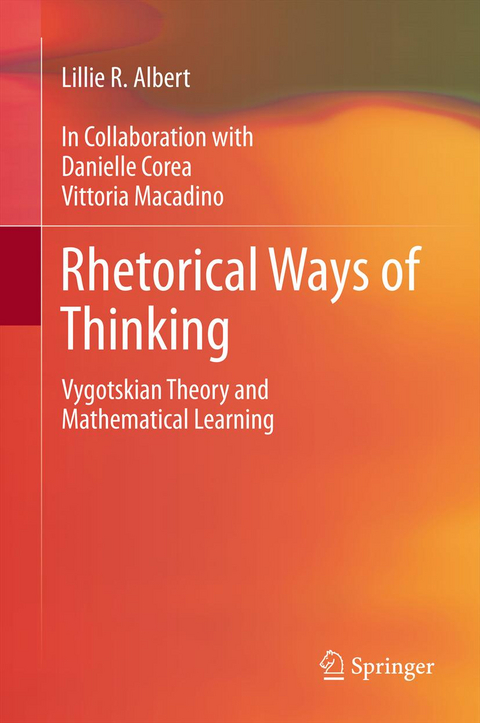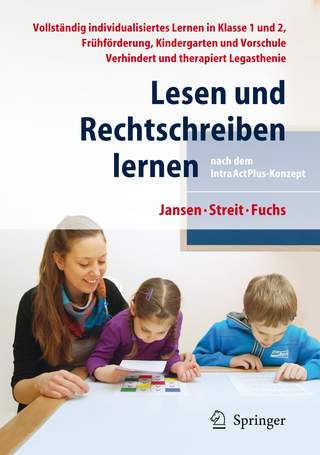
Rhetorical Ways of Thinking
Springer (Verlag)
978-94-007-9650-8 (ISBN)
Rhetorical Ways of Thinking focuses on how the co-construction of learning models the interpretation of a mathematical situation. It is a comprehensive examination of the role of sociocultural-historical theory developed by Vygotsky. This book puts forward the supposition that the major assumptions of sociocultural-historic theory are essential to understanding the theory’s application to mathematical pedagogy, which explores issues relevant to learning and teaching mathematics-in-context, thus providing a valuable practical tool for general mathematics education research. The most important goal, then, is to exemplify the merging of the theory with practice and the subsequent applications to mathematics teaching and learning. This monograph contains five chapters, including a primer to Vygotsky’s sociocultural historic theory, three comprehensive empirical studies examining: prospective teachers’ perception of mathematics teaching and learning and the practice of scaffolded instruction to assist practicing teachers in developing their understanding of pedagogical content knowledge. Finally, the book concludes with a contextualization of the theory, linking it to best practices in the classroom.
The Author of the work is Lillie Albert Lillie R. Albert, an associate professor at Boston College Lynch School of Education, has a Ph.D. in Curriculum and Instruction from the University of Illinois at Urbana-Champaign. Her research focuses on the influence that sociocultural historic contexts have on learning and development of learners across the lifespan. Her specialization includes the exploration of the relationship between the teaching and learning of mathematics and the use of cultural and communicative tools to develop conceptual understanding of mathematics. She has published her research in leading national and international journals in her field and presented papers at major research conferences. Her other books include The Decision to Learn with Monica Digman and Student Self-Identified Multiple Intelligence Profiles: A Systematic Technique for Successful Mathematical Problem Solving with Sheila Cutler Sohn. She has served as the primary investigator and as a research associate for a number of funded projects by the GE Foundation and the National Science Foundation. She is an active member of the National Council of Teachers of Mathematics and the American Educational Research Association. Other activities include serving as an editorial review panelist for several professional journals; working with the National Research Council of the National Academies as an education panelist; participating as a panelist and site PI for TEDS-M Mathematics and Mathematics Pedagogy Scale Anchoring Study, which is carried out under the sponsorship of IEA and directed by researchers at Michigan State University; and collaborating with mathematics education scholars at Seoul National University of Education, Seoul, South Korea to explore government policies in supporting the preparation of mathematics teachers. In Collaboration with Danielle Corea graduated from Boston College in 2010 with a bachelor degree in English and Human Development. She worked as a Research Fellow under Prof. Albert for three years of her undergraduate study. She later completed a year of post-graduate service through AmeriCorps VISTA in the Center for Faith and Public Life at Fairfield University in Connecticut. Currently, she is the program coordinator for the Center. She focuses her work on service learning and the Jesuit Universities Humanitarian Action Network (JUHAN). Vittoria Macadino graduated from Boston College in 2010 with a Bachelor’s Degree in Secondary Education and Mathematics. She was the recipient of the Albert A. Bennett Award for outstanding academic achievement in mathematics. In 2011, Ms. Macadino completed a Master’s Degree in Curriculum and Instruction through the Fifth Year Program at Boston College. For all five years of her undergraduate and graduate studies, she worked closely under Prof. Lillie Albert as a teaching assistant and Research Fellow contributing to the research, analysis, writing, and editing of many book chapters and articles on mathematics education. Most recently, she collaborated with Dr. Albert and graduate student Karen Terrell on an article entitled The Mathematics Excellence Partnership: Developing and Sustaining Professional Learning Communities, currently in press in the Journal of Mathematics Education Leadership. For the past two years, Ms. Macadino has also worked as a mathematics tutor in the Options Through Education Summer Transitional Program, helping to prepare a diverse group of students for entry into Boston College. She is currently teaching mathematics at Newton North High School in Newton, Massachusetts.
Preface.- Chapter 1 Introduction.- Why Rhetorical Thinking.- Overview of Chapters.- Chapter 2 Vygotsky’s Sociocultural Historic Theory, A Primer.- INTRODUCTION.- TOOLS OF HUMAN INTENSIFICATION.- Mediation through Signs.- THE DEVELOPMENT OF HIGHER PSYCHOLOGICAL FUNCTIONS.- Distinguishing Between Lower and Higher Functioning.- THE ROLE OF THE ZONE OF PROXIMAL DEVELOPMENT.- The Complex Nature of the Zone of Proximal Development.- Learning Potential, Performance, and Context.- Intersubjective Learning.- CONCEPT DEVELOPMENT IN THINKING.- Spontaneous and Scientific Concepts.- THE RELATIONSHIP BETWEEN THINKING AND LANGUAGE.- CONCLUSION. Chapter 3 Images and Drawings: A Study of Prospective Teachers' Perceptions of Teaching and Learning Mathematics.- INTRODUCTION.- AN EMERGING FRAMEWORK METHODOLOGY.- Coding Drawings.- Analysis of Focus Group Transcripts.- RESULTS.- The Changing Roles of Teachers.- Student Affect and Pedagogy.- Trends in Mathematical Representations and Content.- Changes in Room Structure.- DISCUSSION OF RESULTS.- CONCLUSION.- Chapter 4 Improving Teachers’ Mathematical Content Knowledge through Scaffolded Instruction.- INTRODUCTION.- THEORETICAL FRAMEWORK AND RELEVANT RESEARCH.- Explanation of the Framework.- METHODOLOGY.- Context and Participants.- Data Sources and Procedures.- Data Analysis.- FINDINGS.- Content Knowledge: Pretest and Posttest.- Presurvey and Postsurvey Results.- Talk and Scaffolded-Interactions.- Teacher-learner Talk and the More Knowledgeable Other.- DISCUSSION OF FINDINGS.- Connecting Learning to the Field of Social Interaction.- The Importance of Language and Action.- CONCLUDING COMMENTS.- Chapter 5 Closing Thoughts and Implications.- Teacher-generated Drawings as Tools of Human Development.- Achieving Intersubjectivity through Collaborative Learning.- Index.
| Mitarbeit |
Sonstige Mitarbeit: Danielle Corea, Vittoria Macadino |
|---|---|
| Zusatzinfo | XII, 100 p. |
| Verlagsort | Dordrecht |
| Sprache | englisch |
| Maße | 155 x 235 mm |
| Themenwelt | Geisteswissenschaften ► Psychologie ► Pädagogische Psychologie |
| Mathematik / Informatik ► Mathematik | |
| Sozialwissenschaften ► Pädagogik ► Allgemeines / Lexika | |
| Sozialwissenschaften ► Pädagogik ► Bildungstheorie | |
| Sozialwissenschaften ► Pädagogik ► Schulpädagogik / Grundschule | |
| Schlagworte | Mathematics content knowledge • Mathematics teacher education • Scaffolding • Sociocultural historic theory • Vygotskian theory • Vygotsky |
| ISBN-10 | 94-007-9650-1 / 9400796501 |
| ISBN-13 | 978-94-007-9650-8 / 9789400796508 |
| Zustand | Neuware |
| Haben Sie eine Frage zum Produkt? |
aus dem Bereich


